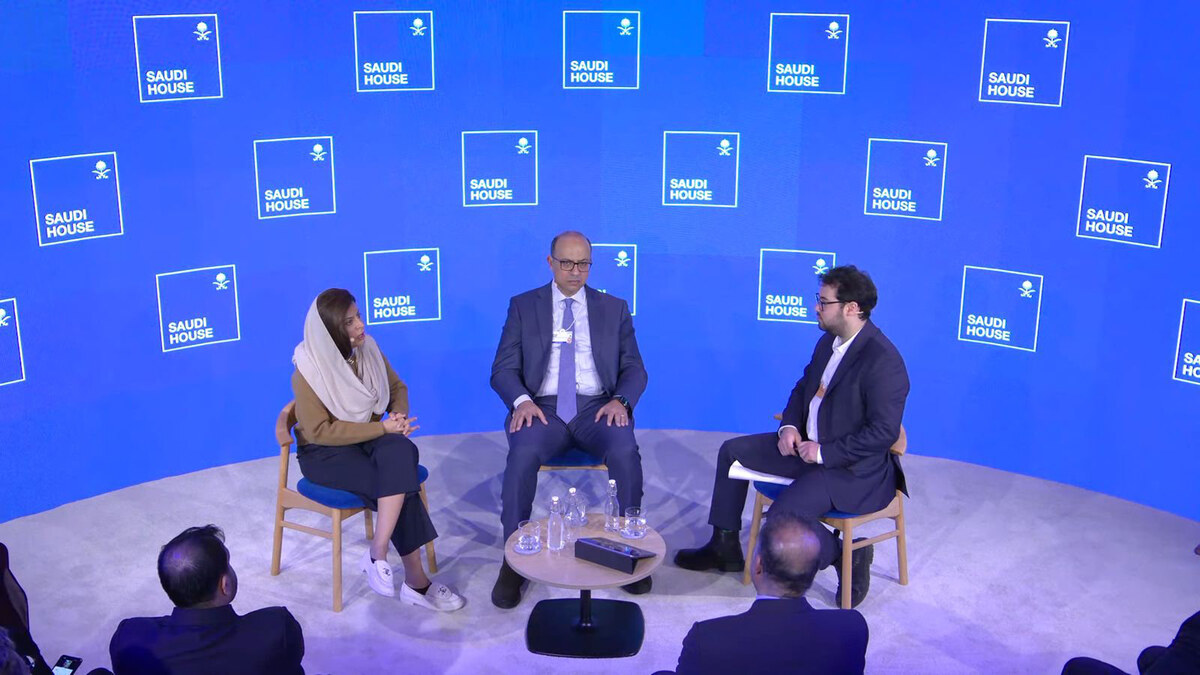JEDDAH: Not so long ago, the very notion of flying cars was considered pure science fiction. However, a recent public demonstration in Saudi Arabia has shown that the technology is not only real, but could soon become a staple of the public transport and logistics network.
Officials from the Kingdom’s Ministry of Transport and Logistics, the General Authority of Civil Aviation, and the Ministry of Hajj gathered in the Saudi city of Makkah on June 12 to watch what was billed as the first successful test flight of a self-driving aerial taxi.
The EH216-S eVTOL electric aerial vehicle took off in an autonomous trial designed to showcase its potential for transporting pilgrims between the holy sites, facilitating emergency travel, delivering medical equipment, and providing logistical services.
It is the world’s first air taxi licensed by a civil aviation authority.
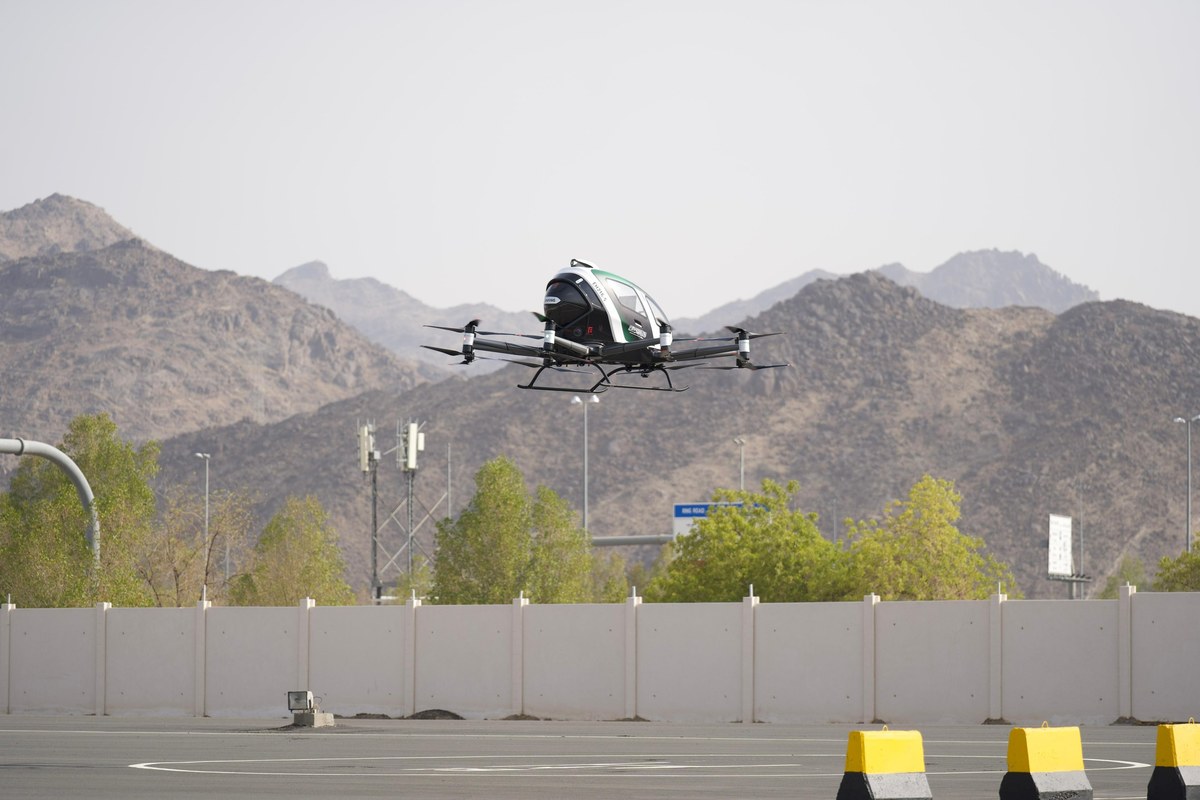
The EH216-S eVTOL electric aerial vehicle takes off during a trial flight in Makkah on June 12. (SPA)
Saleh bin Nasser Al-Jasser, the minister of transport and logistics and chairman of GACA, said the air taxi trial is part of the Kingdom’s broader initiative to provide the latest transport technologies.
“The trial was done in order to make sure the air taxi could provide services during the Hajj season,” Al-Jasser told Al Arabiya, speaking from inside the aerial vehicle.
“Pilotless and controlled from the ground, this aircraft fits in two people and can fly without fuel for a distance of up to 40 km, powered only by electricity, in full compliance with all safety parameters.”
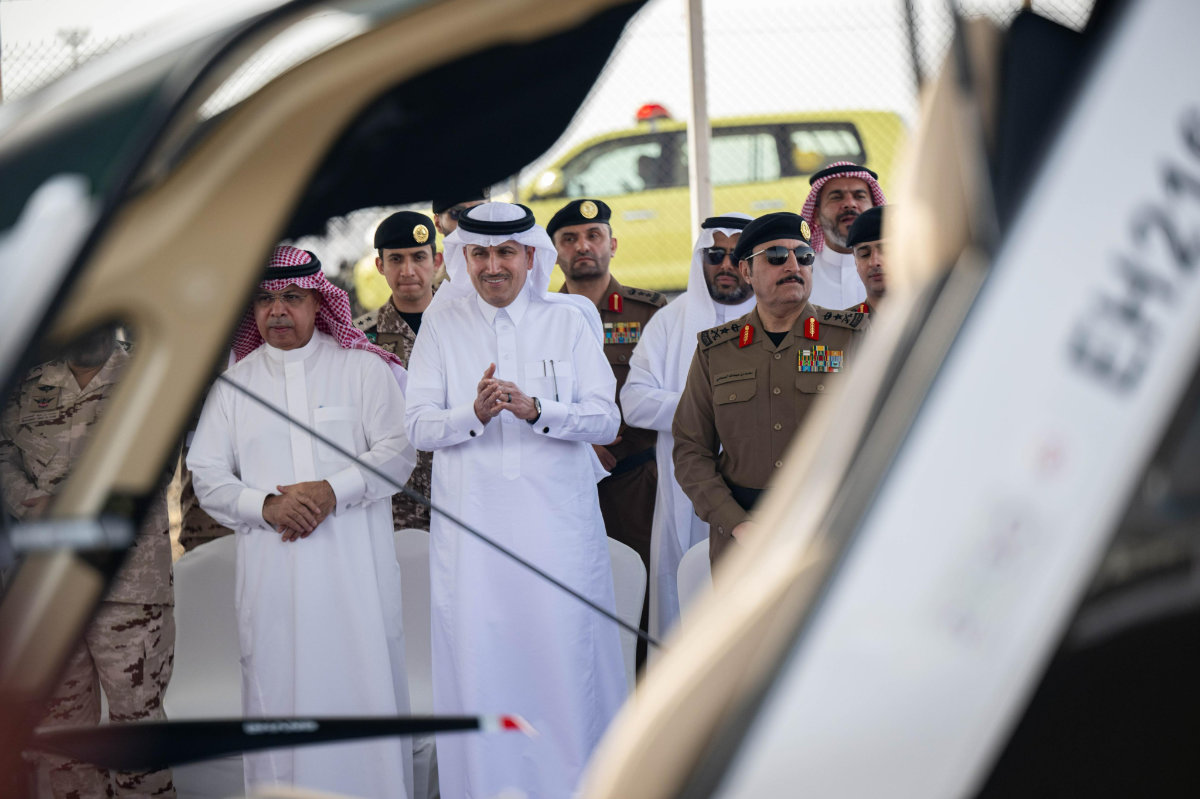
Saudi Transport and Logistics Minister Saleh bin Nasser Al-Jasser (center front) watch as the electric aerial vehicle takes off during a trial flight in Makkah on June 12. (SPA)
The trial provided valuable insights and data to support GACA’s development of an advanced air mobility road map, including a regulatory framework tailored to provide safe and sustainable air transport solutions for Hajj pilgrims.
Al-Jasser said further trials and experiments would be carried out in future to allow the vehicle to fly over a longer distance and with increased speed.
“We are following up on all the technologies available in order to be among the first countries that can benefit from these services, particularly in serving Hajj pilgrims,” Al-Jasser told Al Arabiya.
The Ministry of Transport and Logistics plans to roll out the new electronic vertical take-off and landing models, or eVTOLs, by 2026. Once up and running, passengers will be able to travel between Jeddah and Makkah in less than 20 minutes.
“This groundbreaking trial is a pivotal step towards a faster, more efficient, and sustainable Hajj travel,” Al-Jasser said in a statement. “Saudi Arabia is leveraging pioneering technologies to empower pilgrims with a seamless and sustainable pilgrimage experience.”
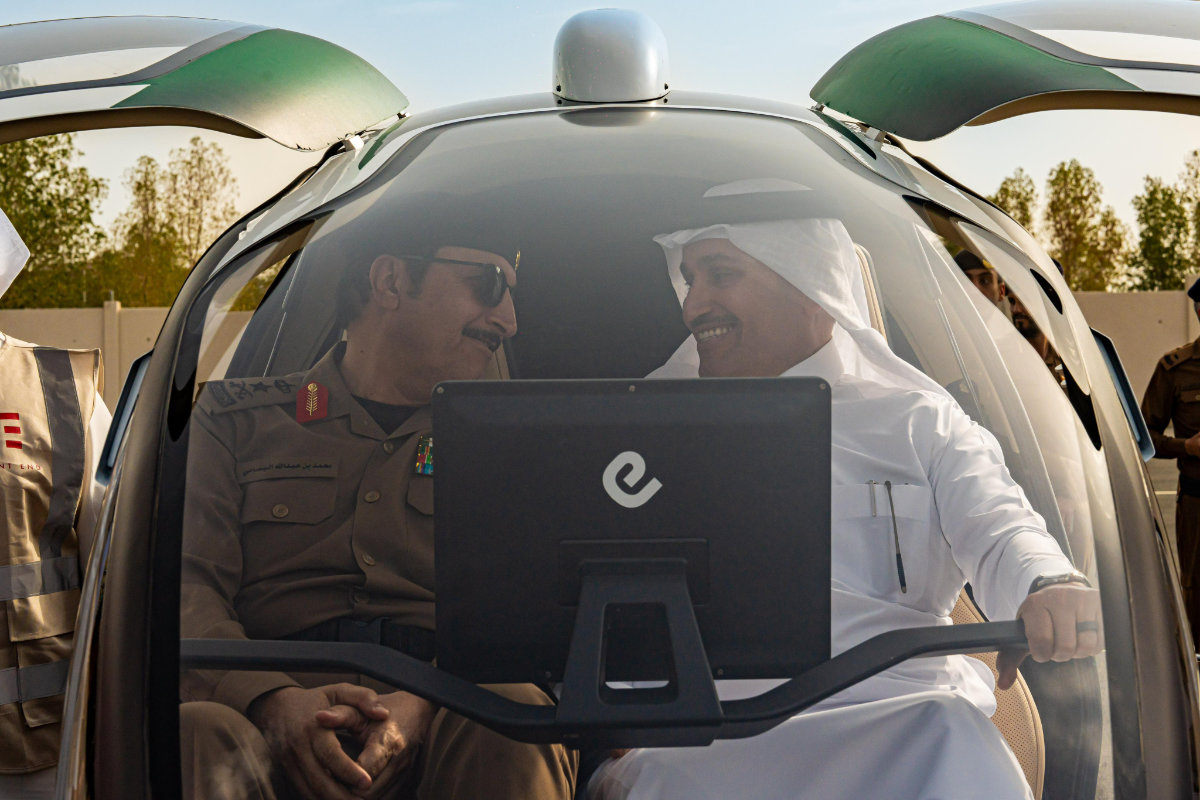
Saudi Transport and Logistics Minister Saleh bin Nasser Al-Jasser (right) and Lt. Gen. Mohammed bin Abdullah Al-Bassami, director of public security, try the electric aerial vehicle during a trial flight in Makkah on June 12. (SPA)
In doing so, Saudi Arabia aims to support a modern transport sector in line with the goals of Vision 2030 — the Kingdom’s economic diversification agenda.
Flying taxis are not the only technology developed under the Kingdom’s national transport and logistics strategy. Electric road vehicles and hydrogen-powered trains are also revolutionizing how the public and cargo will get from A to B.
Alongside the deployment of new vehicles, Al-Jasser said his ministry is developing smart mobility, drafting legislation and regulations, and providing experimental environments to test their real-world application.
These and other innovations, including AI-controlled traffic-management cameras and drones, are expected to help reduce passenger travel times in congested areas, particularly during emergencies, facilitate the transport of goods and medical supplies, and speed up surveillance and inspection tasks.
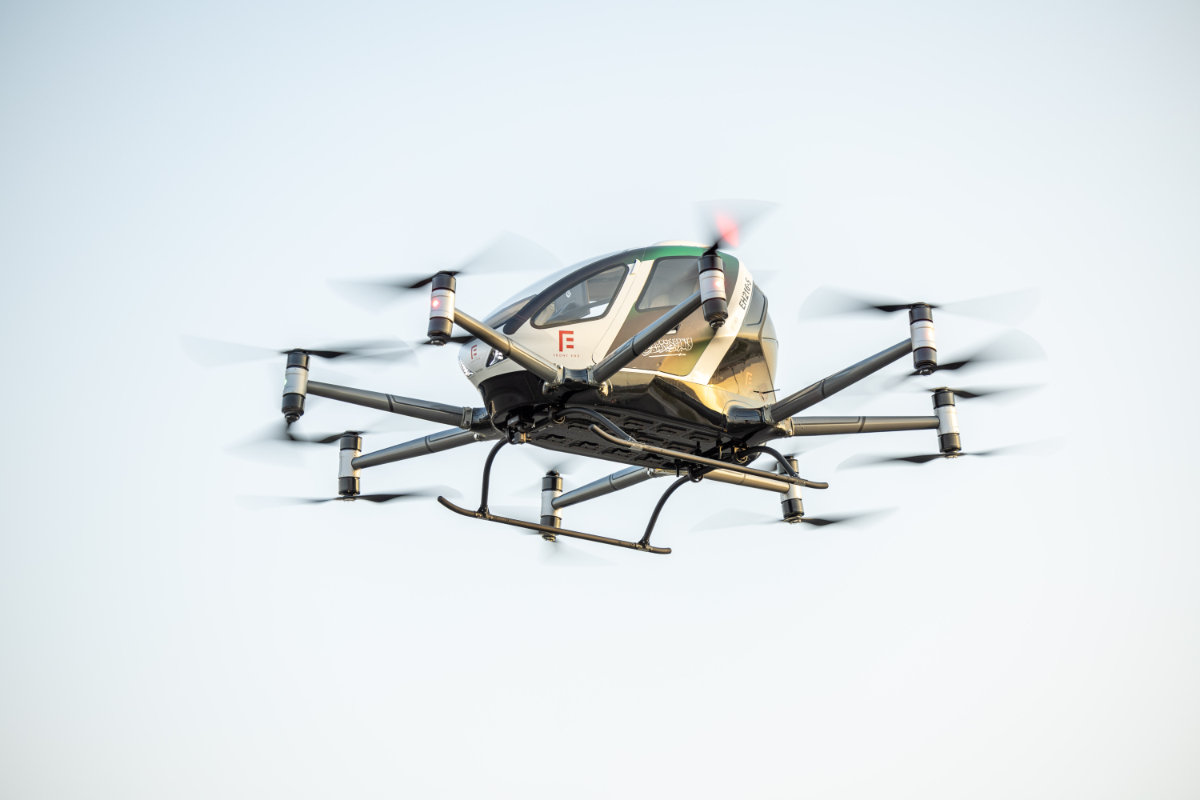
The EH216-S eVTOL pilotless electric aerial vehicle takes off during a trial flight in Makkah on June 12. (SPA)
Speaking after last week’s demonstration, Abdulaziz Al-Duailej, president of GACA, said he and his department are committed to developing services that will allow pilgrims to perform their rituals with ease.
“This air taxi trial marks a major advancement in integrating advanced air mobility solutions into Saudi Arabia’s aviation landscape,” he said in a statement.
“GACA is committed to enabling new safe and sustainable forms of air transport, elevating travel for pilgrims and passengers across Saudi Arabia. This trial acts as a proof of concept for multiple use cases and contributes to the advancement of mobility solutions across the Kingdom.”
He added: “We appreciate the instrumental support of Front End and EHang to mark this historic milestone for Saudi Arabia.”
Front End, a leader in integrating advanced technologies across various sectors, was the Saudi company behind last week’s demonstration, supported by its Chinese partner, EHang, a leading urban air mobility technology platform company.
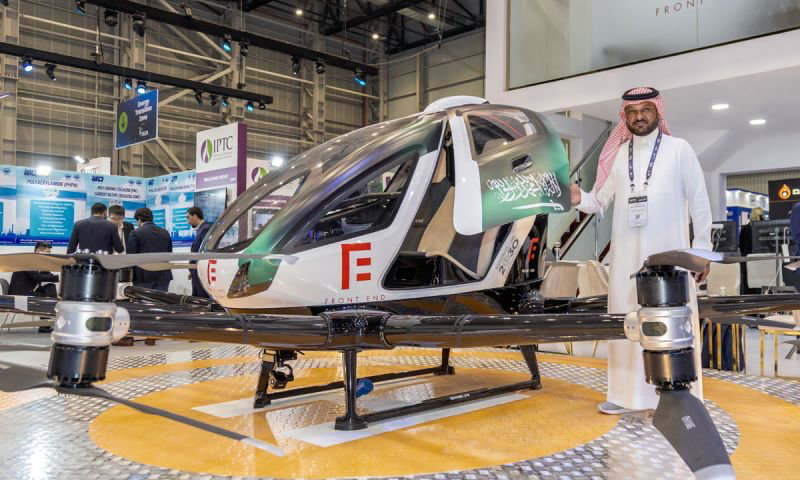
A pilotless EH216-S eVTOL electric aerial vehicle is displayed at the Front End Limited Co.'s showroom. (LinkedIn photo)
“Front End is paving the way to a new era in smart mobility solutions, potentially revolutionizing Hajj transportation,” Majid Al-Ghaslan, the firm’s CEO, said in a statement.
“Aligned with Saudi Vision 2030, our purpose is to foster a ‘Connected Kingdom,’ serving as a gateway for our partners to access growth opportunities in Saudi Arabia and the wider region.
“This achievement stands as a testament to the power of government-private partnerships in accelerating new technology adoption. Partnering with EHang made this pioneering solution a reality.”
He added: “These eco-friendly marvels offer a cost-effective solution for urban transportation, tackling congestion while aligning perfectly with the Kingdom’s goals for a sustainable future. This advancement underscores Front End’s dedication to national progress and its commitment to shaping a greener, more efficient tomorrow in mobility.”
Also speaking after last week’s demonstration, Huazhi Hu, founder, CEO, and chairman of EHang, said: “This debut flight of the EH216-S pilotless eVTOL in Saudi Arabia marks a significant milestone in EHang’s ongoing internationalization and an important step forward in propelling global advanced UAM reform, showcasing the potential of our pilotless eVTOL products and solutions for widespread adoption in the Middle Eastern market.
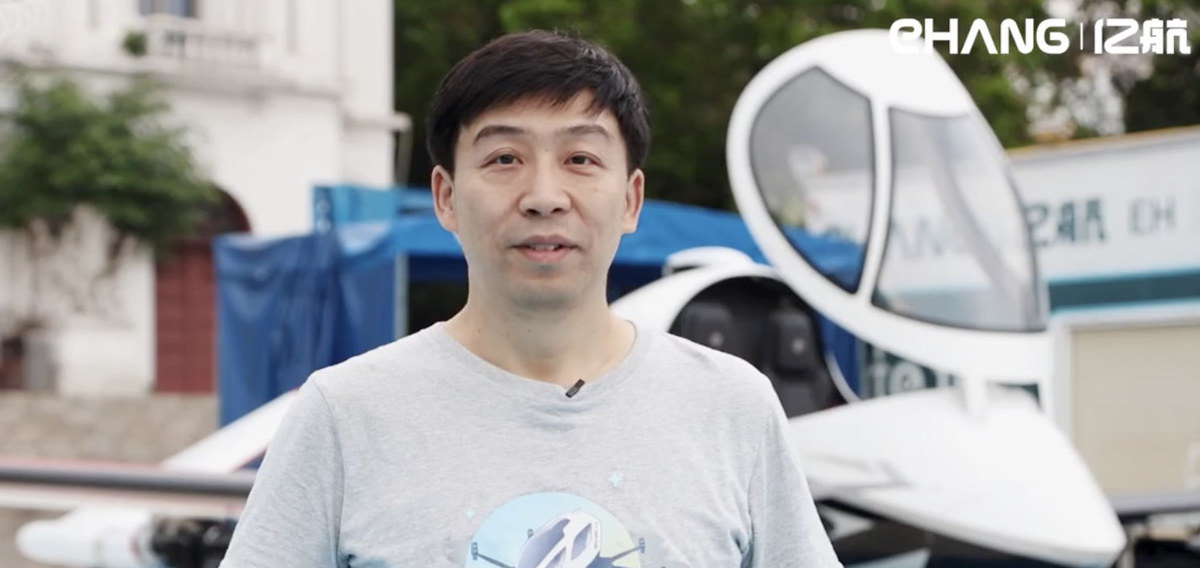
Still image from a video showing Huazhi Hu, EHang founder, CEO and board chairman, with one of his company's air mobility vehicle in the background. (EHang video)
“Looking ahead, with the strong support of GACA and in partnership with Front End, we will work together to establish a benchmark for regular AAM operations in Saudi Arabia, driving progress in both regional and global AAM markets.”
Saudi Arabia has invested hundreds of millions of dollars into AAM solutions under the Saudi Aviation Strategy, which aims to transform the Kingdom into the Middle East’s leading aviation hub by 2030.
The strategy is unlocking more than $100 billion worth of investment, with passenger numbers growing by 26 percent in 2023 to 112 million.
Saudia, the Kingdom’s flag carrier, has unveiled plans to launch its own air taxis by 2026 to help ferry Hajj pilgrims between King Abdulaziz International Airport in Jeddah and hotels in Makkah close to the Grand Mosque. It plans to purchase around 100 aircraft.
The chosen model for these air taxis is the German-made Lilium jet. Although the initial plan is to transport pilgrims, Saudia is also looking at options to connect to various other destinations, contributing to the Kingdom’s burgeoning tourism sector.
The potential for this technology was amply demonstrated in 2021 when NEOM, Saudi Arabia’s new smart city in the Kingdom’s northwest, teamed up with German company Volocopter to establish a joint venture to scale advanced air mobility. They successfully tested a flying taxi in 2023.
Travelers making the Hajj pilgrimage will have to wait until 2026 before they can try out the flying taxis for themselves.












